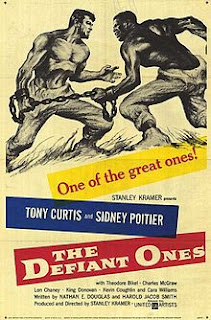 Spike Lee has popularized the term "Magical Negro," to highlight a particular stereotype of African-Americans in American art. Several features comprise this term beyond the fact that the character is African-American. One, the character is disabled in some way. Two, the character lacks any personal history. Three, the character is responsible for transforming the white man into a better person through an almost magical power. Four, the character would die for the white person. And five, the character allows whites to like individual blacks while still hating black culture as a whole.
Spike Lee has popularized the term "Magical Negro," to highlight a particular stereotype of African-Americans in American art. Several features comprise this term beyond the fact that the character is African-American. One, the character is disabled in some way. Two, the character lacks any personal history. Three, the character is responsible for transforming the white man into a better person through an almost magical power. Four, the character would die for the white person. And five, the character allows whites to like individual blacks while still hating black culture as a whole.
Sidney Poitier provides an oft cited example for his role as Noah Cullen in Stanley Kramer's The Defiant Ones. Certainly, other Poitier roles could be given as examples (the magical transformation of Spencer Tracy in Guess Who's Coming to Dinner?), but The Defiant Ones is perhaps the more obvious choice since Poitier is literally chained to John "Joker" Jackson (Tony Curtis).
Spike Lee is right in assessing the Magical Negro as more than a tragic hero with a tragic flaw. He is also right in identifying it as a patent stereotype. But social qualities are not synonymous with racial ones. Why not look at the connection between Cullen and "Joker" Jackson as male bonding? Taken as a major premise, much in the same way the Magical Negro is, The Defiant Ones, unlike Guess Who's Coming to Dinner, becomes less a tale of the Magical Negro who transforms the white man than a tale of how men are at a loss to achieve any emotional depth in their relationships with one another. At the very least, if we are to take this film as a social (not merely formal) event, the connection between men must be considered.
The thought experiment of male bonding as the major premise does not work though. The Defiant Ones, is still subject to Spike Lee's criticism, even as a story of breaking masculine stereotypes, since Lee could easily respond by pointing out that black masculinity is different than white masculinity. Lee would not be merely privileging race over gender in so doing. After all, how is this movie at any moment non-racial? How is it possible to see the film as simply about two men? How could we take the film as if it were between two men without race, or compare it to a tale of either two black men or of two white men? The racial element of the film is where much of its power comes from. Two men of similar background would make the film fall flat. Without a difference, conflict cannot be generated and there would not be a plot. Consequently, race is the essential feature over masculinity just as class would be an essential feature if the film portrayed a rich man and a poor man (of the same race) chained together. In this way, race is the only effective ground for a major premise.
Maybe the next question is whether The Defiant Ones represents progress over say, a D.W. Griffith film, or it is simply the same thing in a different guise. Is this film better than brutally racist films on account of its subtlety, or is it merely different or even worse for its subtlety? If The Defiant Ones is merely different or even worse than films filled with obvious racial hatred, there is no responsible way to enjoy it. If The Defiant Ones is better than films with obvious racial hatred, to what extent are we allowed to enjoy it in light of Lee's criticism of Poitier as the Magical Negro?
Maybe the next question is whether The Defiant Ones represents progress over say, a D.W. Griffith film, or it is simply the same thing in a different guise. Is this film better than brutally racist films on account of its subtlety, or is it merely different or even worse for its subtlety? If The Defiant Ones is merely different or even worse than films filled with obvious racial hatred, there is no responsible way to enjoy it. If The Defiant Ones is better than films with obvious racial hatred, to what extent are we allowed to enjoy it in light of Lee's criticism of Poitier as the Magical Negro?
The Defiant Ones is most likely better than a D.W. Griffith film, but there is no way to look back now without Spike Lee's "Magical Negro." However Spike Lee sees film history and whether or not film history has progressed, the continued effort to make art along the stereotype of the Magical Negro curbs the progressive in art. Perhaps the remaining question could be directed to what constitutes "progress" at all. If The Defiant Ones is right, blacks and whites need each other and are in this together. If Lee is right, this cannot come at the price of cultural homogeneity, which is achieved largely in terms of subservience to white ideology.
IMDb rates this film 7.7 out of 10
Film 101 rates it 5 stars out of 5 (not red stars)
A selection of other films starring Sidney Poitier:
A Patch of Blue, The Slender Thread, In the Heat of the Night, Lilies of the Field
Film 101 rates it 5 stars out of 5 (not red stars)
A Patch of Blue, The Slender Thread, In the Heat of the Night, Lilies of the Field